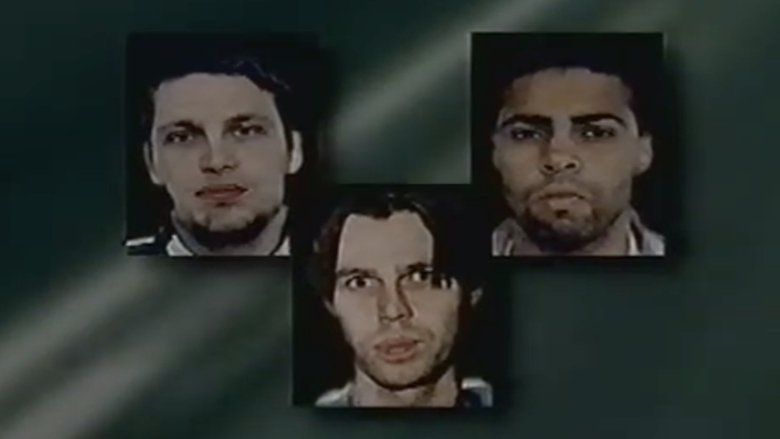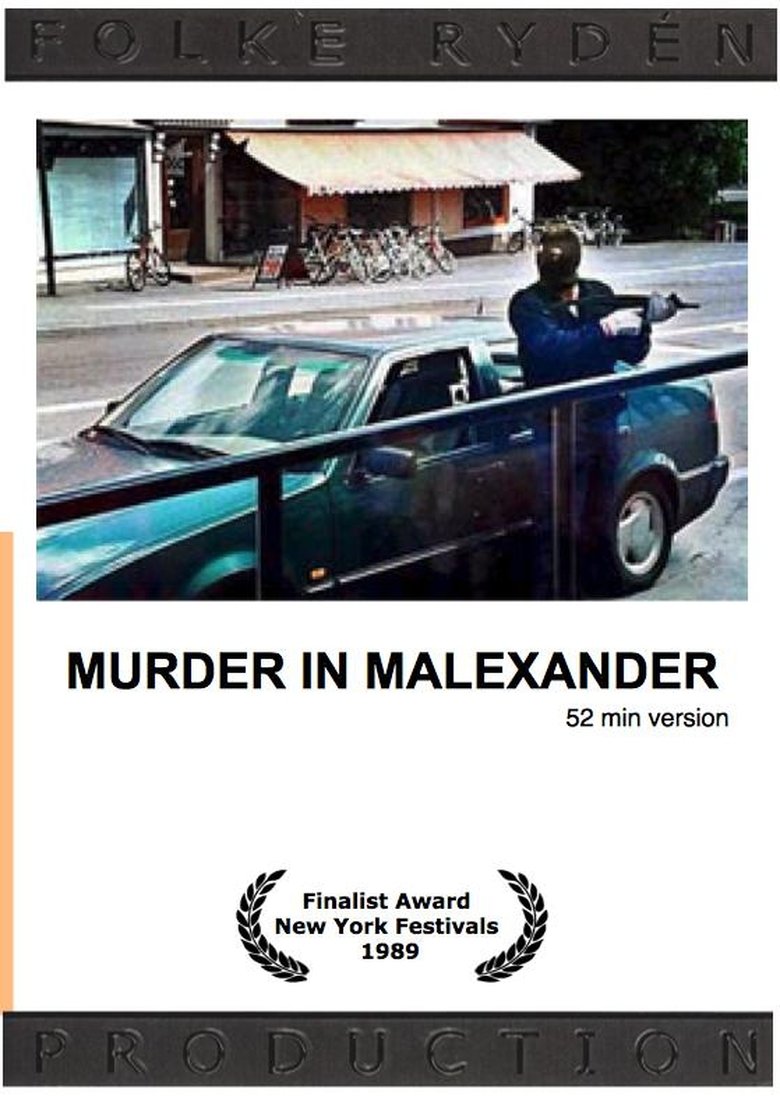

Murder in Malexander
Genres
Overview
Depicts the controversial double police murder, involving neo-nazism and a theatre project by one of Scandinavia's most celebrated playwrights. The film traces a complex and fascinating chain of events leading up to the fatal climax in the picturesque small town of Malexander, Sweden.
Details
Budget
$0
Revenue
$0
Runtime
97 min
Release Date
2001-05-24
Status
Released
Original Language
Swedish
Vote Count
1
Vote Average
8
Tony Olsson
Self/Perpetrator/Actor in 7:3
Lars Norén
Self/Director/Writer of 7:3
Isa Stenberg
Self/Producer of 7/3
Bruno Årfors
Narrator
Gunnar Engström
Self/Executive Swedish Prison & Probation Service
Jackie Arklöv
Self/Perpetrator
Andreas Axelsson
Self/Perpetrator
Kenneth Eklund
Self/Local Police Head
Pernilla Rask
Self/Bank Cashier
Astrid Gladh
Self/Robert Karlström's Mother
Annelie Ljungberg
Self/Olle Borén's Partner
Cecilia Borén
Self/Olle Borén's Daughter
Lars-Åke Lundberg
Self/Priest
Reine Brynolfsson
Self/Actorin 7:3
Eva Söderlindh
Self/Prompter in 7:3
Maria Curman
Self/SVT Drama
Thomas Lyrevik
Self/CEO Riksteatern
Bob Pettersson
Self/Local Police Kisa
Sonny Björk
Self/Police Forensic
Peter Johansson
Self/Psychologist Kumla Prison
Henrik Belfrage
Self/Prof. Criminology
Mats Nilsson
Self/Prisoner/Actor in 7:3
Magnus Fransson
Self/Witness of Motorcycle
Jan Hermansson
Self/Bank Executive
Lars Petersson
Self/Photo Shop Owner Kisa
5.7
Who was Hitler
Hitler's biography told like never before. Besides brief historical localizations by a narrator, only contemporaries and Hitler himself speak: no interviews, no reenactment, no illustrative graphics and no technical gadgets. The testimonies from diaries, letters, speeches and autobiographies are assembled with new, often unpublished archive material. Hitler's life and work are thus reflected in a unique way in interaction with the image of the society in the years 1889 to 1945.
2017-11-16 | de
5.0
Hitler: The Comedy Years
A documentary about the portrayal of Adolf Hitler in popular culture.
2007-05-10 | en
7.0
Mendelssohn is on the Roof
2011-01-01 | fr
7.0
Karajan: Portrait of a Maestro
An account of the life and work of controversial German orchestra conductor Herbert von Karajan (1908-89), celebrated as one of the greatest musicians of the twentieth century.
2019-09-22 | de
7.5
Fascism in Colour
After the World War I, Mussolini's perspective on life is severely altered; once a willful socialist reformer, now obsessed with the idea of power, he founds the National Fascist Party in 1921 and assumes political power in 1922, becoming the Duce, dictator of Italy. His success encourages Hitler to take power in Germany in 1933, opening the dark road to World War II. (Originally released as a two-part miniseries. Includes colorized archival footage.)
2006-01-01 | en
7.2
Man on the Roof
Detective Martin Beck investigates the grisly murder of a police Lieutenant in his hospital room, he soon realises the urgency of the case when it turns out the killer may hold a hatred for all policemen.
1976-10-01 | sv
6.5
Forbidden Films
Between 1933 and 1945 roughly 1200 films were made in Germany, of which 300 were banned by the Allied forces. Today, around 40 films, called "Vorbehaltsfilme", are locked away from the public with an uncertain future. Should they be re-released, destroyed, or continue to be neglected? Verbotene Filme takes a closer look at some of these forbidden films.
2014-03-06 | de
4.5
100 Years of the UFA
The intricate history of UFA, a film production company founded in 1917 that has survived the Weimar Republic, the Nazi regime, the Adenauer era and the many and tumultuous events of contemporary Germany, and has always been the epicenter of the German film industry.
2017-08-28 | de
6.0
Repetitioner
The theatre 7:3 project was conducted at the Tidaholm prison 1998-1999. What started as an artistic experiment, ended up in police killings at Malexander. The process in the prison were filmed during 6 months.
2005-11-02 | sv
8.0
Poland 1939: When German Soldiers Became War Criminals
September 1st, 1939. Nazi Germany invades Poland. The campaign is fast, cruel and ruthless. In these circumstances, how is it that ordinary German soldiers suddenly became vicious killers, terrorizing the local population? Did everyone turn into something worse than wild animals? The true story of the first World War II offensive that marks in the history of infamy the beginning of a carnage and a historical tragedy.
2019-08-31 | de
7.3
Goering's Catalogue: A Collection of Art and Blood
For more than a decade, Reichsmarschall Hermann Goering, Adolf Hitler's right-hand man during the infamous Third Reich, assembled a collection of thousands of works of art that were meticulously catalogued.
2021-03-14 | fr
5.3
Hitler's Junkies
In Third Reich, the abuse of drugs made commanders and soldiers feel invincible. The Führer himself took them on daily basis. This is the unbelievable story of the D-IX project and of methamphetamines, which, abundantly furnished to soldiers, changed the course of history.
2015-12-11 | fr
6.5
The Dead Nation
A documentary-essay which shows Costică Axinte's stunning collection of pictures depicting a Romanian small town in the thirties and forties. The narration, composed mostly from excerpts taken from the diary of a Jewish doctor from the same era, tells the rising of the antisemitism and eventually a harrowing depiction of the Romanian Holocaust.
2017-08-25 | ro
0.0
Projekt Huemul: The IVth Reich in Argentina
In 1946, President Peron started a secret nuclear project with the help of Nazis refugees which consisted in the use of a new method "Nuclear Fusion". Five years later, he would announce to the world his succeed. Even today, no country around the world has achieved it.
2008-08-31 | es
4.5
No Contest II
Sharon Bell is back, this time she must stop a terrorist plot to smuggle Nazi nerve gas.
1996-11-22 | en
7.0
Kids On Ice
Quiet towns across rural Australia are in the grip of an Ice epidemic. Major international drug cartels are working with local outlawed motorcycle gangs to push crystal meth to a captive market of children.
2014-10-21 | en
6.0
Opus pro smrtihlava
1984-01-01 | cs
6.0
Bela Bartók
A portrait of the life and work of the great Hungarian composer Béla Bartók, exploring both his music and his passionate interest in his country's folklore.
1964-05-24 | en
6.5
Ravensbrück: The forgotten camp
Located nearly 80 kilometres north of Berlin, Germany, the former municipality of Ravensbrück was home to a prison between 1939 and 1945 that became a concentration camp designed specifically for women. It was built by order of Heinreich Himmler, a high dignitary of the Third Reich and head of the SS. Of the more than 130,000 people who were deported there, almost 90,000 never returned. Based on witnesses, international experts and computer-generated images, the document reveals the atrocities committed in Ravensbrück.
2020-02-11 | fr
8.0
Treblinka's Last Witness
Samuel Willenberg and Kalman Taigman, the last two survivors of the Nazi extermination camp Treblinka, recount the horrors they experienced during the war and talk about their lives after their escape in a prisoner uprising in 1943. Willenberg would go on to become a hero of the 1944 Warsaw uprising while Taigman would be called as a witness during the infamous trial of Adolf Eichmann.
2012-08-15 | en